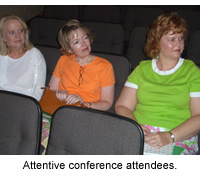Some things I learned in Lexington, South Carolina...
 Wendy Gallager and Ruth Rish put together a fabulous handheld computer conference, hosted by the Lexington School District One in Lexington, South Carolina. I spoke at the conference and enjoyed the enthusiasm attendees brought with them.
Wendy Gallager and Ruth Rish put together a fabulous handheld computer conference, hosted by the Lexington School District One in Lexington, South Carolina. I spoke at the conference and enjoyed the enthusiasm attendees brought with them.
Mike Curtis, author, professional developer, and all-around good guy, gave a luncheon presentation titled Why Can’t We All Just Get Along? Palm vs. Pocket PC. His entertaining and informative presentation began with a photo of himself holding several Palm m125s. Life was easier in those days because when choosing a handheld, your only decisions were if you wanted a color screen and if you wanted a rechargeable battery. Now there are so many choices, including Bluetooth, WiFi, amount of memory, processor speed, resolution, and operating system. To help you decide on which handhelds to purchase, Mike recommends Brighthand’s PDA & Smartphone Advisor. Just go to Brighthand.com and click "Advisor."
 Mike noted an interesting change he’s witnessed in educational handheld computing. It used to be that schools purchasing Palm OS handhelds outnumbered schools buying Pocket PCs 9 to 1. Mike thinks it’s about half and half now. That’s a big change. With the introduction of the low-priced Dell Axim, Pocket PCs can be found for the same price as many Palm handhelds. The problem is, there is so much more software for Palm than for Windows Mobile. Mike then amazed the audience by showing a Pocket PC running Summing (one of my favorite games, which is Palm OS only). How’d he do that? He was using a beta version of Palm emulation software called StyleTap. It allows you to use Palm applications on a Pocket PC. You can even use the beaming function with the emulated Palm programs. However, any Palm applications that sync their information to the desktop (like Documents To Go or mClass Reading) won’t sync properly. StyleTap costs $30 per handheld. That’s kind of pricey, but Mike speculates that one day a Palm emulator may even ship with all new Pocket PCs, opening the door to over 27,000 Palm applications.
Mike noted an interesting change he’s witnessed in educational handheld computing. It used to be that schools purchasing Palm OS handhelds outnumbered schools buying Pocket PCs 9 to 1. Mike thinks it’s about half and half now. That’s a big change. With the introduction of the low-priced Dell Axim, Pocket PCs can be found for the same price as many Palm handhelds. The problem is, there is so much more software for Palm than for Windows Mobile. Mike then amazed the audience by showing a Pocket PC running Summing (one of my favorite games, which is Palm OS only). How’d he do that? He was using a beta version of Palm emulation software called StyleTap. It allows you to use Palm applications on a Pocket PC. You can even use the beaming function with the emulated Palm programs. However, any Palm applications that sync their information to the desktop (like Documents To Go or mClass Reading) won’t sync properly. StyleTap costs $30 per handheld. That’s kind of pricey, but Mike speculates that one day a Palm emulator may even ship with all new Pocket PCs, opening the door to over 27,000 Palm applications.
Whether they used a Palm handheld or Pocket PC, those in attendance learned a lot, not only from the presenters, but from each other.
